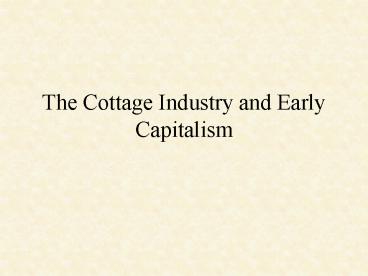The Cottage Industry and Early Capitalism - PowerPoint PPT Presentation
1 / 15
Title:
The Cottage Industry and Early Capitalism
Description:
Supplied materials wool and cotton to cottages to be carded and spun ... Spinning jenny, water frame, spinning mule improved spinning. Power loom sped up weaving ... – PowerPoint PPT presentation
Number of Views:1517
Avg rating:3.0/5.0
Title: The Cottage Industry and Early Capitalism
1
The Cottage Industry and Early Capitalism
2
Merchants Role in Cottage Industry
- Supplied materials wool and cotton to
cottages to be carded and spun - Took supplies from spinning cottage to weaving
cottage to dying cottage to sell finished cloth - Merchants sell product for more than material and
labor costs profit larger investment higher
profit
3
Capitalism
- An economic system based on private ownership,
free competition, and profit - Cottage industry is an example of early
capitalism
4
(No Transcript)
5
Effects of Cottage Industry
- Big profits for new class of merchants
- Alternative source of income for peasants
6
Textile Industry and Factory System
7
Textile Industry and Factory System
- Cottage industry couldn't keep up with demand for
textiles - Spinning jenny, water frame, spinning mule
improved spinning - Power loom sped up weaving
- Cotton gin separated seeds from cotton
8
(No Transcript)
9
Rise of Factory
- New machines, often too big for homes, were put
in factories - Factories located near power source coal, iron,
water
10
Effects of Textile Factories in Britain
- Prices of mass-produced textiles were much lower
than hand-produced items - Britains textile industry increased enormously
- Majority of villagers forced to leave to find
work in urban factories
11
(No Transcript)
12
Why did the industrial revolution begin in Britain
- Inventions
- Stone and eventually asphalt roads
- Canals
- Railroad ushered in with the introduction of the
Rocket in 1829 - Colonies supplied raw materials
- Britains natural resources
- Coal
- Carbon necessary for smelting iron
- Steam engines powered by coal
- Iron
- Farming tools, new factory machines, railways
- Smelting makes iron more pure, but requires
carbon
13
Why did the industrial revolution begin in Britain
- Large population
- Transportation
- Railroad
- Increased production and increased need to
transport goods quickly and cheaply - Fueled other industries coal, steam engines,
iron - Banks lent money to entrepreneurs
- Encouraged experimentation
14
Why did the industrial revolution begin in Britain
- Geography
- Climate good for textile production
- Plenty of natural resources sych as iron and coal
- Separation from the European continent kept them
out of wars - Social Factors
- British society less rigid than other European
countries
15
Why did the industrial revolution begin in Britain
- Government
- Internal trade encouraged
- Population allowed to relocate
- Helped build roads and canals
- Colonial Empire
- Supplied raw materials for manufactured goods
- Provided market for goods
- Advantages to Industrializing First
- No other countries competing for manufactured
goods - Monopoly on technology































